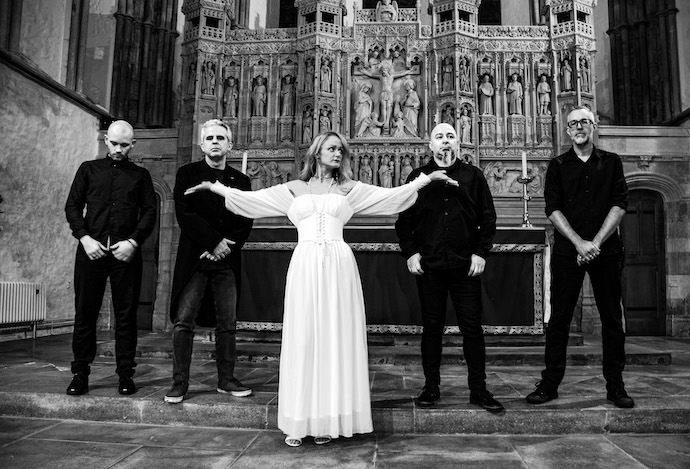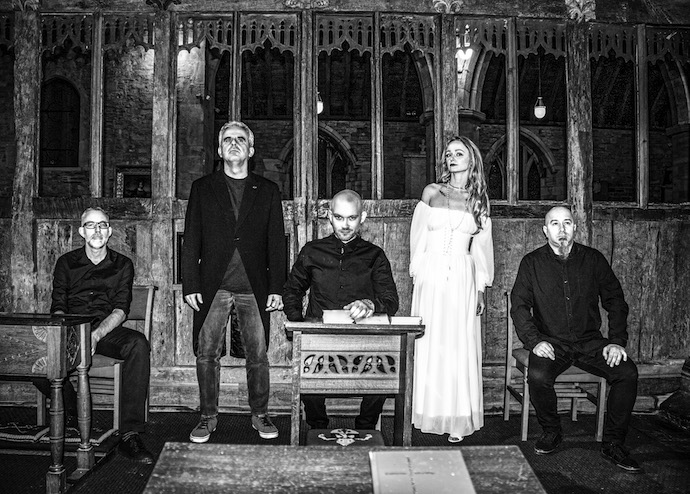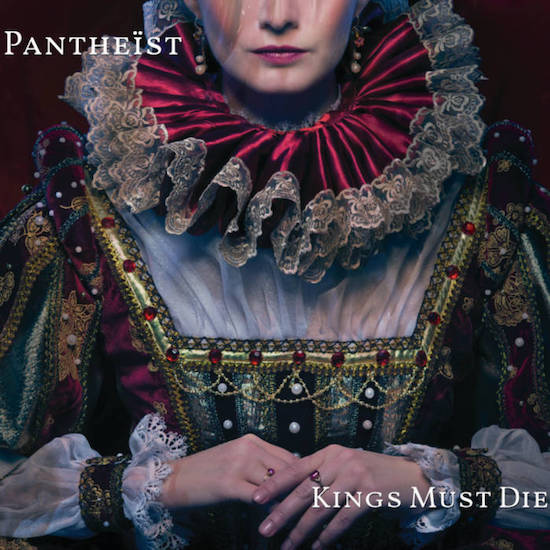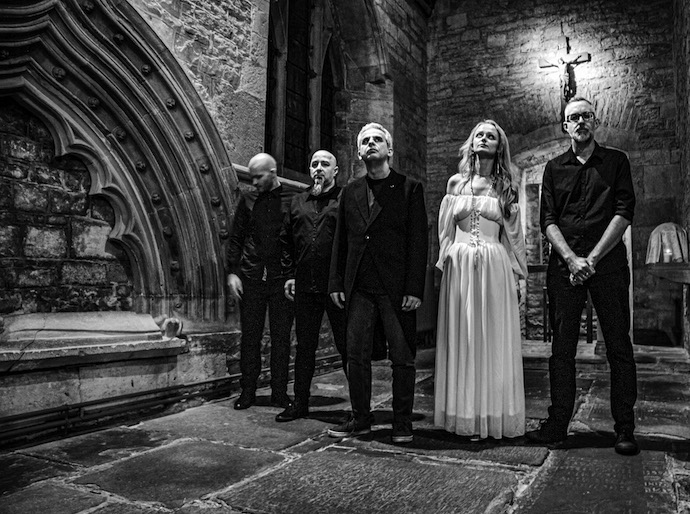
(In March of this year Pantheist released a new album-length EP, and Comrade Aleks found it tremendously good, and he reached out to conduct the following excellent interview with Pantheist‘s Kostas Panagiotu.)
For the past 24 years Pantheist has provided us with the one of most thoughtful and intelligent examples of doom metal in almost every form. They started with funeral doom in the days of O Solitude (2003), they turned to sophisticated death-doom on Amartia (2005), and further on the band moved towards things even more melodic and progressive.
Pantheist’s previous full-length album Closer to God saw the light of day in 2021, and this year the band returns with the 50-minute-long EP Kings Must Die. What’s good there? Believe me, that’s an album that’s worth listening to. And I believe this interview with the Pantheist’s founding member Kostas Panagiotu (vocals, keyboards) will only prove this statement.

Hi Kostas! How are you? What’s new on Pantheist’s side?
Hey comrade Aleks! It’s always a pleasure to talk to you. All is good here. Things seem to be running smoothly for Pantheist lately, which is admittedly not very doomy. We are currently rehearsing for some upcoming UK gigs in March, and integrating our latest member, soprano Linda Dumitru, into our live sound! It has been a positive challenge, as we are re-arranging our older tracks to add her vocals to them, but so far reactions have been overwhelmingly positive!
Why did you choose to include soprano after 24 years of running Pantheist?
In short, because the opportunity arose to do so. I always had ideas for tracks that suited professional singers, which I could not execute myself with my, let’s say, idiosyncratic way of singing. I mentioned this some time ago to our drummer (who is clearly much better at networking than I am) and next thing I knew, he had contacted Linda and gauged her interest to sing some tracks for us.
Once we knew she was interested, we moved quickly and got her to do some backing vocals on the new track, as well as re-arranging at rehearsals some of our old tracks with her vocals and introducing her to some of our live shows.
I took sometime ago the decision to work with local people and avoid becoming yet again a travelling circus of musicians living all over the world, so the fact that she is based in Cardiff and has a cool personality which fits with the rest of the band, have been important factors which are helping us integrate her quickly into the band.
The first association for soprano and doom is Theatre of Tragedy (and Funeral too). Why do you think such a “gothic doom” wave never touched the British underground?
It’s a good question, but I don’t have the answers. While the UK has some of the best atmospheric doom metal bands in the world, it’s clear that the media and the majority of metal music listeners in this country prefer more straightforward Sabbath-inspired doom, or ‘harder’ metal such as sludge or death doom (with the emphasis on death metal). Even doom metal ‘institutes’ such as My Dying Bride and Paradise Lost seldom play gigs in the UK, unless it’s a big festival or some type of ‘special occasion’ event.
Pantheist’s new EP Kings Must Die is the most topical thing today, but I have other questions, before we turn to it. You recorded Closer to God (2021) with four new members, and then you recorded the instrumental single Fthagn – Nagh (2022). So what kind of God are you closer to?
In the last 5-10 years, I get increasingly the feeling that humanity is on the verge of either reinventing itself or collapsing. I still think the second scenario is the most likely thing to happen. The pandemic was some sort of test, which I think humanity has failed miserably. All it did was highlight the inequality among people and bring out the worst of governments in terms of greed, selfishness, and individualism.
Closer to God was in a sense a comment on what I was observing in the world around me. It was meant in the sense of ‘closer to our maker’ as we have reached a point where we can easily self-destruct and destroy the whole planet with us. However, as a band we always had a bit of a spiritual, some would say ‘religious’ sound, and ‘closer to god’ also refers to that flirting with religious themes the band is known for.
May we expect new songs inspired by Lovecraftian myths from you?
I don’t think so, it’s not really an obvious fit with the themes of the band. Fthagn-Nagh was an exception, as the theme was determined by the game (Quake) and the level we made the soundtrack for. Quake is one of my favorite shooter games and it always had very strong Lovecraftian themes, so we worked with them when Noel (the game designer) and I discussed the track.
Honestly, I don’t remember many Lovecraftian references in Quake besides Shub Niggurath boss and Clark Ashton Smith’s shambler. But I appreciate Quake. Quake and Blood are always in my heart. However, did you play Call of Cthulhu: Dark Corners of the Earth? Accidently I found that it’s Greg Chandler (Esoteric) himself who composed the soundtrack to it!
I knew that Greg had made some video game music but wasn’t aware that it was for a Lovecraft-inspired game. Will need to check it out!

One of the key songs you recorded for Closer to God is “Strange Time”, and its live version is included in the new EP. Is this song so important to you? Is it your manifest? An anthem of escapism?
It is an important track, but I wouldn’t say it’s some sort of manifest or anthem. It is however taking the whole of side 1 on the album setting the scene of its musical and lyrical themes, and it certainly captures well the idea of humanity watching with apathy from the sidelines while the world around it implodes due to its actions.
So Kings Must Die contains four tracks. I was a bit skeptical from the start, because you know – one new song and three live ones. But these live tracks recorded at the Organic Doom show are gorgeous. How did you came out with this idea to use a real pipe organ?
I’m glad you think so! Yes, we are very satisfied with how the live tracks ended up sounding. We worked with Mark Mynett (producer of the last two My Dying Bride albums) to get the best possible sound.
The idea came from Kirkless council, who wanted to organize some events to promote the pipe organ to people outside of its niche classical circle, basically to make the instrument more ‘hip’ and cool. David Pipe (what’s in a name…) the organist at Huddersfield Town Hall who played there his pipe organ recitals on Mondays, got in touch with Mark Mynett (who is a professor at Huddersfield University), who in turn brought him in touch with Mark Deeks from Ard. It made sense to use the pipe organ with doom bands, as the droning, heavy organ sound complements slow metal very well. This is of course known to anyone who has ever listened to Skepticism, Profetus, Quercus, etc.
I am a live musician in Ard, so Mark Deeks kindly invited me to bring Pantheist to be also part of the event. Both Ard and Pantheist recorded that live performance, and this well-attended event bizarrely became mainstream news covered by The Guardian, BBC and popular radio programs.

Did this covering somehow affect Pantheist in the end? Or did it only benefit organ music players?
While the angle of the coverage was focusing on ‘wow, how unusual, metal music with a pipe organ!’ (as doom fans we of course know for ages how well this combination works) I’m sure it didn’t harm Pantheist in any way. The TikTok post I made from the Pantheist account about the BBC covering the event, went viral with thousands of views and likes, and hundreds of comments!
How did you collaborate with David Pipe, who performed the organ parts? Was it easy enough to channel all of your ideas this way?
It was a bit of a challenge, which I have explained in more detail on the liner notes of the CD. But luckily David is a professional musician, and we overcame the challenges, even though it was a very stressful day. Just to give you an idea, David lives four hours away from the band, so we never rehearsed together. I had to transcribe the organ parts to music scores, which again is not something I am used to doing. Then, as we were only the support act on the day, we hardly had 10-15 minutes to soundcheck and I barely had the chance to discuss the scores with David.
Basically, when we performed ‘Strange Times’ in front of 300 people, it was the first time I ever heard him play the track! We also had some personal issues on the day just before the gig, something I won’t delve deeper into. Suffice to say, it’s a miracle we managed to make the tracks sound the way they do under the circumstances, but this makes our achievement all the more remarkable!
As I understand, Organic Doom proved itself as a successful project. Do you already prepare to the next issue with a few more bands on your mind?
I think this is something you need to ask the organizers; we just went along for the ride. I know there have been some talks about it, even involving bands such as My Dying Bride and Paradise Lost, but I don’t know how serious the plans are or whether something else will happen. Not that it would matter if that was the case, it was a unique experience and that’s why it worked so well.
The EP’s central song “Kings Must Die” is one of the most epic and elegant songs in your discography. What’s the concept behind its lyrics? What inspired you?
I’m very pleased with your feedback on the track. The idea came about in the year 2022, when we first had the queen’s jubilee in the United Kingdom and a few months later the queen died, followed up by the crowning of King Charles III. All these events were accompanied by a protracted period of public fawning and royal hysteria, which strongly fed my natural misanthropy.
It was tough to see middle class people being literally in tears, overcome by the emotions of seeing some of the richest and most self-entitled people in the world sitting on golden thrones and wearing diamond hats, while at the same time vilifying, despising, and ignoring the sizeable part of the population in the United Kingdom which lives in abject poverty. These themes fed the lyrics, but also the music and melodic themes of the track, which are full of pump and circumstance.
Furthermore, I used the characteristic string sound of Korg 1 on the opening bars, a sound which has been mostly popularized by the band Queen in their tracks ‘Innuendo’ and ‘The Show Must Go On’, yet another reference to ‘Kings and Queens’.
Such a great plot behind the song! How do you think – do Pantheist’s fans dig this idea? Or did you get negative feedback from people who feel themselves offended because of it? To be offended seems to be a trend now, another sign of the Last Times.
Almost all feedback we have so far received on the track and its theme has been quite positive. I was almost disappointed that no one was offended, because as you say, being offended and ‘cancelling’ people whose opinions you don’t like is all the rage now! But I think that when you are genuine and authentic in your art, people notice and appreciate it, and of course our followers are far from mainstream people who get offended by everything.
It was great to hear Jake Harding, your former colleague from Landskap, performing clean vocals in this song. Did you have him on your mind when you composed it?
I absolutely did. While composing the song, I constantly had his voice on my mind. He is the best vocalist I have ever worked with, and we had previously discussed working together on some new music, so it was inevitable that I would ask him to sing the track. I am very glad I did, because I believe he really lifted it to a higher level with his quality performance.

I have to ask if you discussed with him a chance to bring Landskap back to life, didn’t you?
No I haven’t. I know that some past members have tried to resurrect the band as a studio project, they even checked with me to see if I was ok with them doing it without my involvement. For me this doesn’t matter much anymore, the true spirit of the band is long gone as it was based on organic jams at rehearsals where we were building the tracks, and will not come back with its core members nowadays living in four different countries.
There are a few more guests who took part in this recording, can you introduce them?
The main other guest (other than the organist David Pipe who I introduced above) is soprano Linda Dumitru. As I previously explained, we are now integrating her voice as an integral part of the band, both live and in the studio. We didn’t have much time to give her a major role on this track, but I absolutely wanted her to sing on it so that we could introduce her to our listeners.
You released the second full-length album of your solo project in 2023. How did people greet this instrumental project? Did you find your listeners already?
The reactions to the album were very positive, which means a lot as I haven’t even figured out the genre of the music. It’s atmospheric piano music with some ambient, experimental, and orchestral influences so I was pleased to see my usual fanbase embracing it, despite it being far removed from metal music. I didn’t even send it to publications or blogs for review as I didn’t have an idea of what type of publication would be into that sort of music. But I just had to press the album on CD, it was too important and personal to me to only release it digitally.
All Kings Must Die was released through your own label Melancholic Realm Productions. I can’t stop complaining, but we know it well: the number of doom niches in the higher echelon of the metal business is strictly limited. The Old Big Ones occupy it, and a few more new acts have their chance if they’re lucky enough to be signed by a major label. Do you see it as a problem? Or do you have more topical things to care about?
No, I don’t see it as a problem at all, and to be frank, it occupies my mind very little. I see bigger labels such as Season of Mist or Napalm Records signing what used to be small underground doom metal bands, so there is always a chance for those who are driven and focused enough to be embraced by a significant label, or get some other help from major promoters, publishers, etc.
Personally, I haven’t even entertained the thought of contacting other labels since I first decided to self-release my music in 2016. Honestly maybe I should, as I have found out through experience that self-releasing and promoting your own music is expensive, hard work, and not very good for the mental health of an artist.
What are your further plans for Pantheist in 2024?
We have several gigs coming up this year in the UK and a few European dates to promote the new EP. We are planning to fully integrate Linda into our sound as mentioned above, and I am already writing new demos which will feature her as the main clean vocalist in the band. I am rather excited about this, as I had this idea to integrate symphonic and operatic elements in the band for at least 10-15 years but never had an appropriate vocalist to do so.
And I believe that you’ll find a better way to do it! Thanks for the interview, Kostas, it was good to talk again. Did we skip some important topics?
Well if we did, we will be here next time to fill the gaps, haha. Thanks once again for the detailed questioning Aleks, it stretched me once again into giving hopefully interesting answers!
https://www.facebook.com/Pantheistuk
https://pantheistuk.bandcamp.com/music
https://pantheist.bandcamp.com/album/amartia

Thanks again Aleks for the interesting and detailed questions